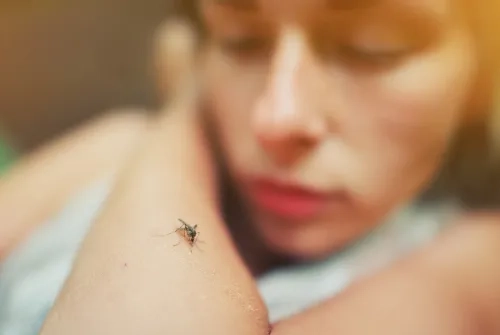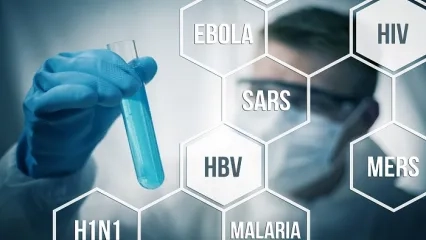Alo Yeditepe
Alo Yeditepe
West Nile Virus Replaces Malaria
West Nile Virus is back on the agenda after a recent death. Stating that there is no need to panic about this viral disease transmitted by the sting of infected mosquitoes, Prof. Dr. Meral Sönmezoğlu: “We had 26 cases last year. Although we anticipate more cases this year, I do not think we should panic. The important thing is to take the necessary measures by increasing awareness.”
West Nile Virus, which is among the diseases caused by the transportation of mosquitoes, is especially common in countries on the migration routes of migratory birds. Since the disease is seasonal, it mostly occurs during the summer and early autumn. As our country is also in this generation and the weather is still warm above the seasonal norms, mosquitoes continue to be at risk of transmitting diseases. Reminding that different species of mosquitoes can transmit different diseases, Yeditepe University Hospitals Infectious Diseases Specialist Prof. Dr. Meral Sönmezoğlu: “However, West Nile Virus is not specific to a certain species. While malaria parasites can infect a specific species, West Nile Virus can infect 20 different species.”
West Nile Virus Prevalence Statistics in the World
Mosquitoes get this disease from migratory birds. The virus settles in the salivary glands of mosquitoes and is then transmitted to humans and horses by mosquito bites. Stating his views on the incident that took place in Thrace the other day, Prof. Dr. Meral Sönmezoğlu reminded us that this is not a new event and that West Nile Virus cases have been encountered in recent years and explained the world numbers:
“Last year, 26 cases of West Nile virus were identified in our country and one person died. According to the ECDC Report, when looking at the European Union countries in 2018, it is seen that there are too many case reports. Of these, 1,503 human cases were identified, including 576 in Italy, 311 in Greece, 277 in Romania, 215 in Hungary, and 217 in other countries. 181 of these cases died. In 2019, 13 cases were reported and one of them died. In fact, these figures show that this is not just a problem for our country. This risk is present wherever mosquitoes are present. However, it should be underlined that case reports are made very well in EU countries.
Since there is a lot of awareness in the USA, the number of reported cases is also higher. Over 800 new cases are reported each year, with only 872 reported in 2019. However, in the US, blood donors are routinely screened for West Nile Virus, and if a negative result is found, only that person's blood can be used. Looking at these figures, there may be more cases in Turkey as well. In other words, there are definitely undiagnosed cases."
80 of the Infected People Have No Symptoms
Studies show that about 80 percent of people infected with West Nile Virus recover from a mild fever. The remaining 20 percent develop nervous system involvement (meningitis, encephalitis, or stroke). Prof. Dr. Meral Sönmezoğlu: “There is nothing to do immediately in mosquito bites, such as ticks or bees. It is necessary to wait for the incubation period. West Nile Virus has a short incubation period, ranging from 3 to 20 days. Symptoms also develop very suddenly. Severe fever above 39 degrees, accompanied by headache, malaise, and weakness throughout the body, and then blurred consciousness. Central nervous system involvement with unconsciousness is about 20 percent. Eighty percent of them just watch with fire and heal on their own.”
Beware of the Fever that Develops After a Mosquito Bite!
Since we are a country in the migration zone of migratory birds, it is necessary to pay close attention to the fire that will occur after mosquito bites, Prof. Dr. Meral Sönmezoğlu: “At this point, it does not matter if the patient remembers or sees the mosquito bite. When s/he observes symptoms such as fever and blurred consciousness, s/he should definitely consult a physician." Reminding that there is no special treatment for West Nile Virus, Prof. Dr. Meral Sönmezoğlu stated, “We apply supportive treatments such as respiratory and circulatory support to this group of patients in the hospital. We want to keep the patient alive.”
What Precautions Should be Taken to Protect?
Stating that it is extremely important to take the necessary precautions since the risk is higher in the summer months, Prof. Dr. Meral Sönmezoğlu continued as follows:
“There are more mosquitoes in puddles where there is human waste, and they make nests. That is why we need to rehabilitate especially stagnant waters and do mosquito control. It is important to carry out spraying on time, wear long-sleeved clothing in areas where mosquitoes are dense, and take protective measures such as fly-repellent spray. When we look at those who lost their lives in the USA, it is seen that the majority of these patients are over 65 years old and have different underlying diseases. Therefore, it is important to remember that especially the elderly group with chronic diseases such as diabetes or kidney disease are much riskier in terms of West Nile Virus, and to act accordingly.”
Other Diseases Transmitted by Mosquitoes
Prof. Dr. Sönmezoğlu said that there was a significant decrease in the number of cases thanks to the increase in awareness in European Union countries and gave the following information about other mosquito-borne diseases.
“Mosquitoes are almost exclusively vectors in nature. It is especially prevalent in areas where human waste and feces are found, and all of them have diseases. The malaria parasite, Zika virus, and Chikungunya virus are transmitted by mosquitoes. Malaria is rarely seen in Turkey. But West Nile Virus took his place. Most of the malaria cases in Turkey come from African and Asian countries. Lİke Zika. Because mosquitoes are now being transported to different regions by airplanes. Zika only existed in South American countries such as Brazil, and Argentina. Zika virus outbreaks are expected in many countries today. It does not mean that there will be no confirmed cases in our country at this time. These diseases can be seen in every country where there are mosquitoes.”
Press Coverage: haberler.com | yenicaggazetesi.com | guncelkadin.com | cnnturk.com | mynet.com
About
Faculty and Year of Graduation:
Medical Faculty of Ankara University, 1984
”
See Also
- What is Hepatitis B? What are its symptoms? How is it Transmitted?
- What is HMPV Virus? HMPV Symptoms and Ways of Transmission
- Why Is the Flu Lasting Longer This Year?
- What Precautions Should Be Taken Against the Cold Epidemic?
- Don't Be Late Fighting Against Diseases
- Antibiotics Kill Beneficial Bacteria, Not Viruses
- What is Hepatitis? What are the Symptoms and Treatment Methods?
- Symptoms and Treatment of Tick Bites
- Summer Infections
- Precautions Must Be Taken Against Loss of Life Due To Infection in Thalassemia
- Information on H1N1 (Swine Flu)
- Summer is Coming... Beware of food poisoning!
- Our Taboos Affect the Increase in the Number of HIV-Positive Cases in Turkey
- Strep A Symptoms and Treatment
- Do Not Put a Cigarette Butt or Pour Olive Oil or Liquid Soap on the Tick
- Reheat the Food You Cooked Only Once!
- HIV Can Be Hidden for 10 Years without Any Symptoms!
- 290 Million People Live Without Knowing They Have Hepatitis
- Things to Consider When Touching Meat at Eid
- What Is Anthrax Disease?
- The Way to Fight AIDS is to Raise Awareness First
- Still Not Too Late For Flu Vaccine
- What is Rhinovirus?
- Fighting with Thalassemia: Meral Yılmaz
- Thalassemia Spreads from the Mediterranean to the Whole of Europe with Migration!
- Early Treatment of Crimean Congo Hemorrhagic Fever is Vital
- Approximately 3 Million Patients Need Blood Transfusions Every Year in Turkey
- When to Get the Flu Vaccine
- Antibiotics Account For 14% of Prescription Costs
- It Is Necessary to Try to Be Healthy in order to Be Protected
- A New Flu Outbreak is Expected Every 10 Years
- 63% of Vector-Borne Diseases are Caused by Lyme Disease
- Experts Warn About Flu Risk
- Mosquito Infection Risk
- Why aren’t Antibiotics Working Any More?
- The World Raises an “Alarm” on Antibiotic Resistance!
- What is COVID-19?
- The Mask Requirement was Removed and the Importance of Social Distance Increased!
- How to Prevent COVID-19 in School-Going Children
- WHO (World Health Organization) Warns for Antibiotic Resistance!
- Who Is Threatened by Monkeypox?
- Ways to Prevent Coronavirus
- Swine Flu / H1N1
- Life Returns to Normal with Caution
- What is Monkeypox Virus? What Are the Symptoms of the Monkeypox Virus?
- What is Lyme Disease?
- How to Tell if You Have a Mild Coronavirus?
- Pay Attention to These Rules for COVID-19
- Hand Sanitizer Usage Guide
- The Priority Rule for the Protection from Summer Infections is Hygiene
Alo Yeditepe




